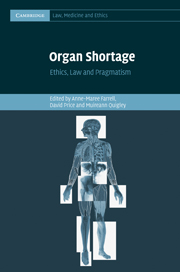Book contents
- Frontmatter
- Contents
- List of figures
- List of tables
- Contributors
- Acknowledgements
- List of abbreviations
- Table of cases
- Table of legislation
- Part I Setting the scene
- 1 A principled and pragmatic approach to organ shortage
- 2 Does ethical controversy cost lives?
- Part II Current issues affecting organ shortage
- Part III Strategies for addressing organ shortage
- Part IV Comparative perspectives
- Part V Current reform and future challenges
- Bibliography
- Index
- References
1 - A principled and pragmatic approach to organ shortage
from Part I - Setting the scene
Published online by Cambridge University Press: 29 March 2011
- Frontmatter
- Contents
- List of figures
- List of tables
- Contributors
- Acknowledgements
- List of abbreviations
- Table of cases
- Table of legislation
- Part I Setting the scene
- 1 A principled and pragmatic approach to organ shortage
- 2 Does ethical controversy cost lives?
- Part II Current issues affecting organ shortage
- Part III Strategies for addressing organ shortage
- Part IV Comparative perspectives
- Part V Current reform and future challenges
- Bibliography
- Index
- References
Summary
Ethical and legal issues concerning organ donation and transplantation have been the subject of much controversy and debate in many countries, especially over the last twenty years. Technological developments in the field have opened up the possibility of transplanting an increasing number of human organs to those in need. The number of organs available for transplantation, however, has not kept pace with such developments. In the United Kingdom (UK) alone, the gap is widening between the number of persons on the national waiting list for organs and the number of available organs, with 7,980 persons on the active national waiting list as of the end of the financial year 2009–10 and approximately 1,000 people dying each year for want of a solid organ transplant. Not only are transplant waiting times increasing in general (primarily for kidneys), but rates of development of end-stage organ failure and disease are continuing to increase, most notably amongst black and ethnic minority populations.
Whilst the number of solid organ transplants performed in the UK continues to rise, this masks two crucial and revealing trends. First, annually the number of living donors now exceeds the number of deceased donors with respect to kidneys, which itself generates accusations that too much reliance is being placed on living donors as sources for organs. The number of living donors has increased in the last decade from 338 in 1999–2000 to 1,032 in 2009–10, a more than 300 per cent rise.
- Type
- Chapter
- Information
- Organ ShortageEthics, Law and Pragmatism, pp. 3 - 14Publisher: Cambridge University PressPrint publication year: 2011



